James Conrad: The Man, the Hair, the Shot, the Legend
James Conrad: The Man, the Hair, the Shot, the Legend
DiscGolfer Magazine catches up with the 2021 PDGA World Champion

James Conrad throws what would become one of the most famous throws in disc golf at the 2021 PDGA Pro World Championship. Photo: Kevin Huver / PDGA
(This interview first appeared in the Fall 2021 issue of DiscGolfer Magazine)
There was a moment before James Conrad threw one of the most iconic shots in disc golf history, a moment when time stood still. You could read the focus on his face. There was no doubt as he lined up his shot: this wasn’t going to be a lay up.
After all, laying up isn’t really a James Conrad move.
Whether it’s with friends, disc golf, juggling or his hair, chances are strong he is going all in.
I spoke with Conrad on July 20 to find out what was going through his head in that moment, how he feels about winning PDGA Worlds and what comes next for the PDGA World Champion. — Jessica Geraci
DGer: It’s been just a few weeks since you became world champion. Have you had time to recharge after all the pressure and excitement?
JC: I definitely think I’ve had some time to recharge. That first week after winning was pretty busy. We booked it out to Minnesota and ended up playing the Majestic A tier that following weekend and then Des Moines the next weekend. But I took this last weekend off and got to go up to the MVP factory and do some media stuff with them and check out some of the new discs they’re working on, so that was a lot of fun. And then I just had a nice, easy relaxing weekend this past one, definitely much needed.
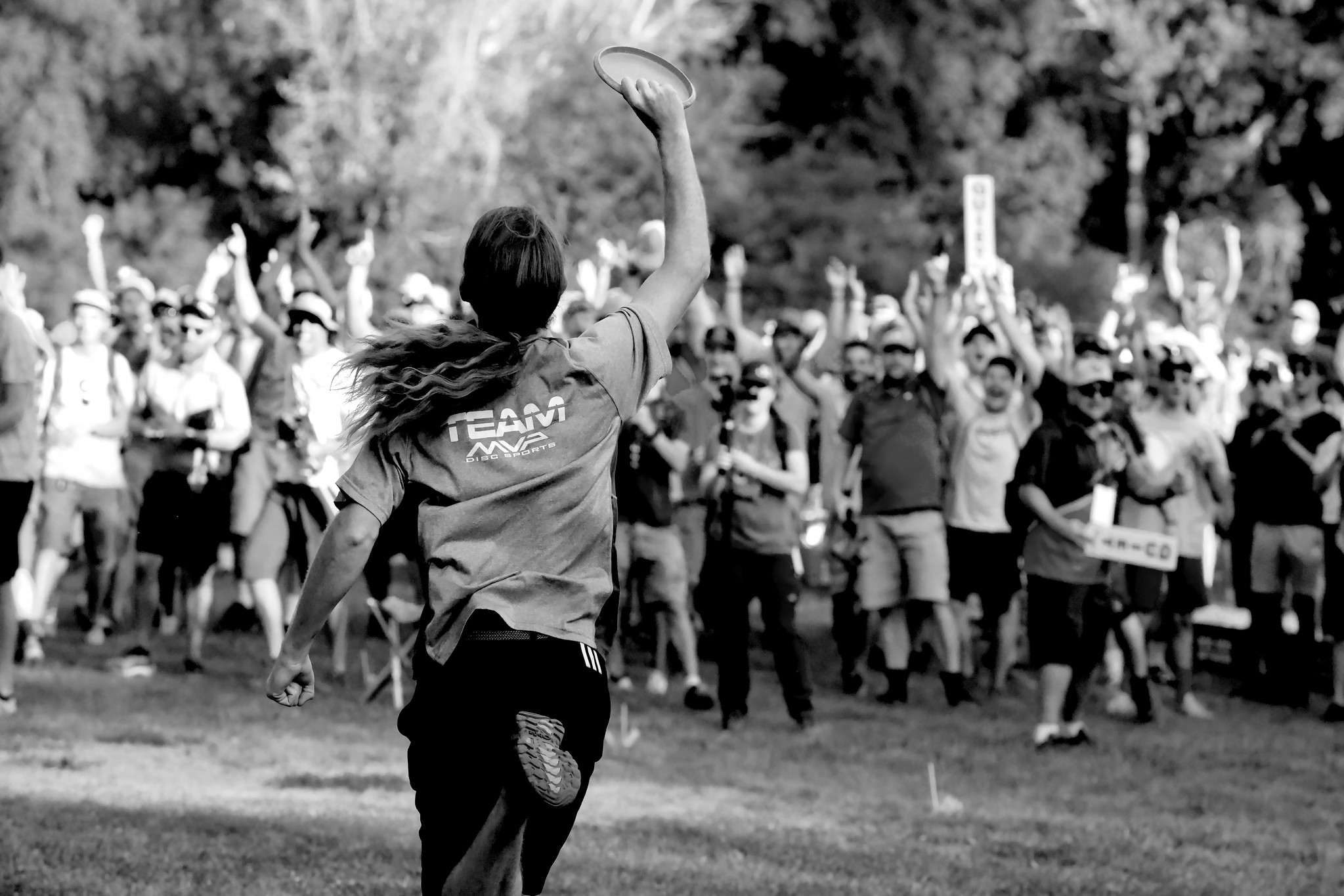
James Conrad celebrates after connecting for birdie on the 18th holes of the 2021 PDGA Pro World Championship. Photo: Conrad Meyer / PDGA
The highlight of your throw-in on hole 18 at Worlds was everywhere, from Sports Center Top 10 to texts from non-disc golfer friends and family who saw the viral video. What do you think that kind of reach does for the sport?
It was really cool how widely viewed it was. I think it definitely adds some validation to our sport. A lot of it comes from just how excited the crowd was that was there watching it. You know, if you see people watching something and the people that are watching it get that excited, I feel like it adds an element of validation, it makes it seem more legitimate just to see that many people getting that excited for something. So I think that was pretty huge for us and I think it will help push disc golf more into a mainstream, spectator sport, hopefully.
What was the attention like for you, as a more introverted person? Are you sick of talking about the shot yet?
A little bit. It’s been slightly overwhelming at times, you know. Pulling up to a disc golf course and just having a whole bunch of people wanting some of my attention all at the same time is a lot. But it’s always been really good vibes and really nice attention, so it’s been nice overall. Yeah, it’s funny to kind of have the same conversation with 100 different people, you know, but it’s not too bad. It’s been nice.
Ok good, because I’m going to make you talk about it again. You were 252 feet from the basket. You knew you needed to throw it in — or at least get close — for the chance at the World title. Right before you threw, as you lined up your shot, there was a look of complete resolve and determination on your face. What was going through your head in that moment?
It’s a little hard to describe. It was definitely a moment of trying to just center myself as well as I could and to gather as much focus as possible and give myself the best chance I had at making it. I had nothing to lose at that point and obviously, as it played out, everything to gain from making that, from at least giving it a chance. So I was trying to read the shot, you know, decide how high up and how wide I was going to have to start it, and how hard I’d have to throw it, just making sure I gave it enough to at least get there. The only mistake I guess I could have made at that point was to come up short. So just trying to think about all of that, but then as I was lining up, and as I had picked my starting point and everything, was trying to just kind of push all of the pressure away from me and just focus on my breathing for a moment and visualizing the shot.
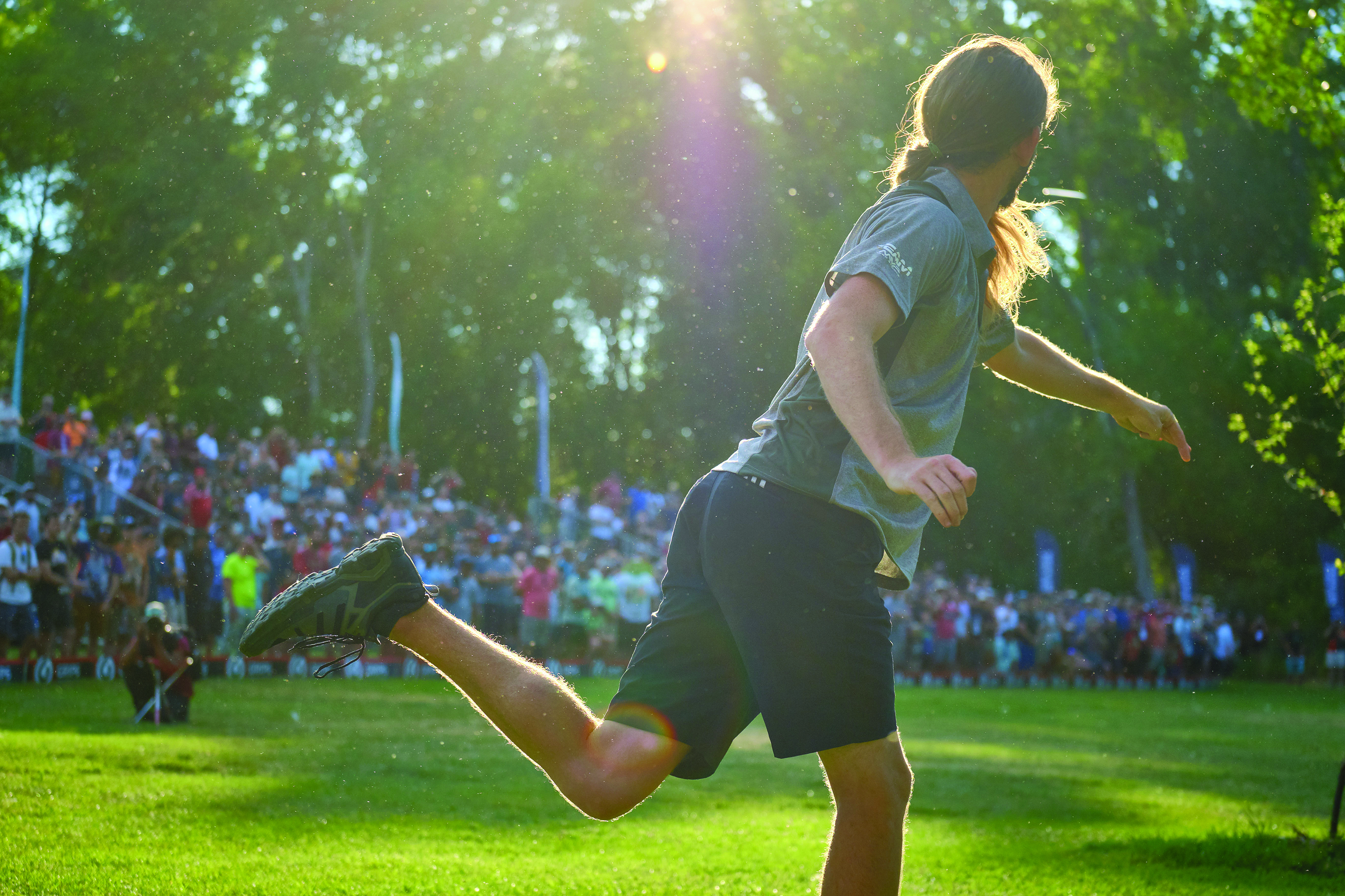
James Conrad knew he would be running the shot on 18 in Utah. Photo: Kevin Huver / PDGA
How do you commit to a shot like that? Was there ever any thought in your head that you weren’t going to run it, or did you know from the second you stepped up to it?
I knew I was going to be running it, pretty much when I got to my lie after my tee shot, I was kind of on the bank there with poor footing, so I had no chance of getting my second shot near the basket. At that point I pretty much decided if I want to win, I’m going to have to chip it up there in bounds and then try to make it. So when I was approaching my lie for my third throw [the Holy Shot], that’s all I was thinking about: how can I get this in there.
It seems like you attack every shot by giving it your all and fully committing. Where does that come from, how do you put that confidence behind your shots?
I guess I’ve just found the most success when I really commit to my lines and commit to my shot. I wouldn’t say I’m always trying to make it, but even if it’s just a line, like trying to safely get it through the gap versus trying to punch one through the gap, I’ve found more success attacking it and fully committing. Like with my aggressive run up, I feel like I really get my momentum going towards my gap and it makes it easy for me to just continue that with the throw. When I feel really comfortable with the putting stroke, it makes it a little easier to really attack because if I really commit to my shot and end up hitting the line but going 30 feet long or something, not being stressed about that come-back putt definitely takes some of the pressure off those shots and lets me fully commit to them.
After your disc went in, you could immediately feel the energy and excitement from the crowd and across social media. It was very evident just how much, and how many, people were rooting for you. How does it feel to have that much support behind you?
It’s amazing. I think that in the long term will be the most memorable part about it for me. You know, the win is huge but just to feel that strong of emotions from that many people all centered on me was pretty much indescribable, it was so cool. In the moment, it was a little overwhelming, it was like people were congratulating me already and it’s like, whoa, this is just to tie it. I still had a playoff to get to, so I wasn’t trying to get ahead of myself and overly celebrate too early. Obviously I celebrated pretty hard for the shot but shortly after that I tried to start regaining my focus and looking forward into the playoff, rather than staying in that celebratory moment. I definitely think I’m a bit of a crowd favorite, people like the way that I play the game and that’s a really cool feeling, but there’s also the element of it where people tend to root for the underdog or they want to see the comeback. Everyone wants to see the sudden death playoff, so all of those things with me being behind going into that hole were kind of in my favor. If the roles had been reversed, and I was up one and Paul threw it in, I think it would have been just as exciting because he was behind and it would force the playoff. I think the whole circumstances of the moment are part of what made it so awesome.
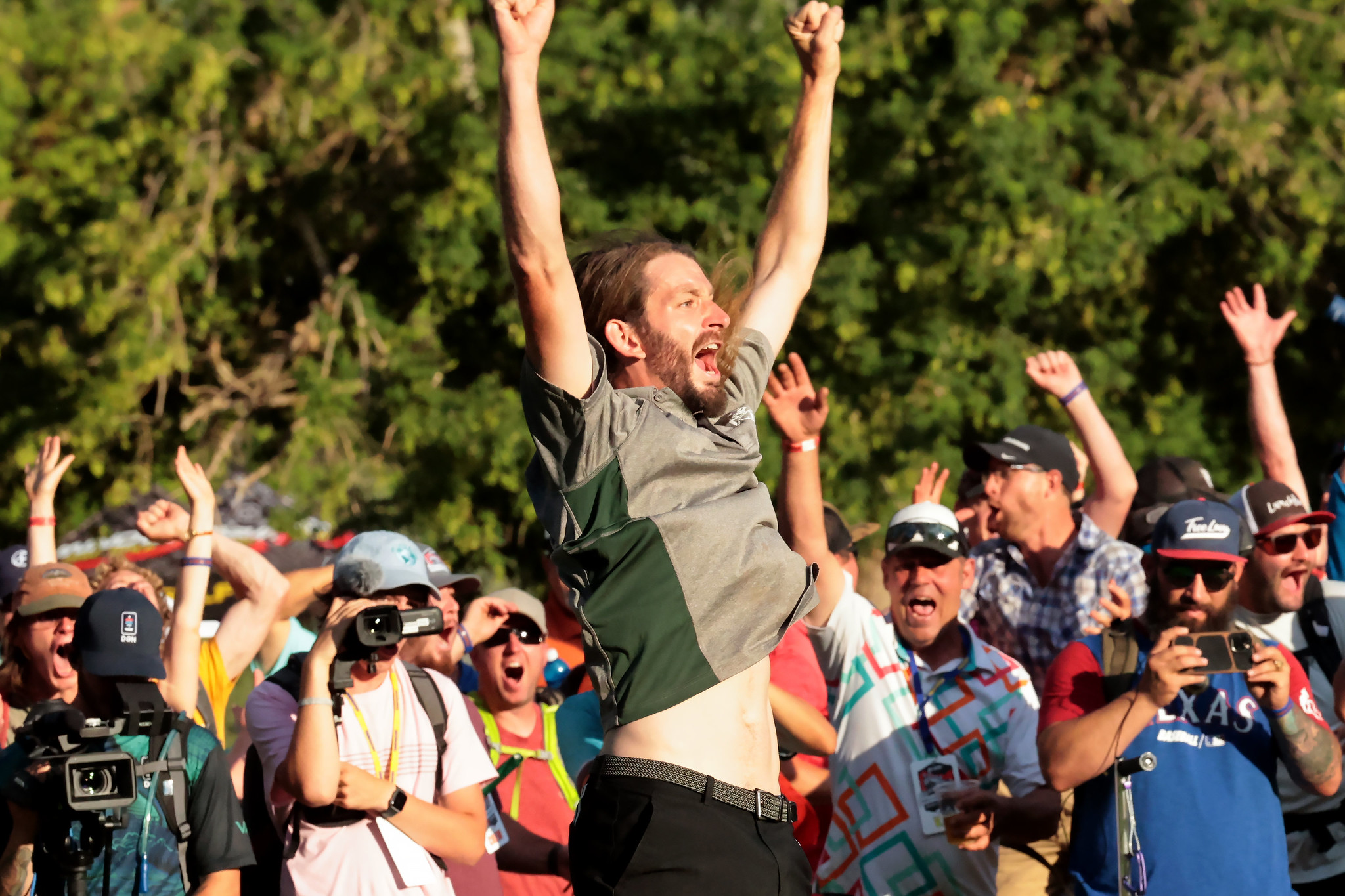
It was a wild celebration at The Fort in Ogden, Utah. Photo: Conrad Meyer / PDGA
People had such a wholesome reaction, the energy from every video of that moment can just instantly make anyone feel happy. Do you have a favorite reaction?
Like you said, all of them were pretty amazing. It was cool just to see pretty much across the board, people’s jaws drop, even the competitors on my card. Maybe one of my favorites was one of the videos I saw had Kevin Jones pretty clearly in the frame. Obviously he was right in the mix of things until hole 16, but in the video he put his hands on his head and jumped up and down once or twice and then just froze with his mouth open, just staring like “oh my gosh.” That one hit me pretty hard. Kevin’s a good friend of mine and such a good competitor, but just to see the amazement from him as a competitor and a friend right in that moment was pretty special.
After hole 18, when you were heading to the playoff, how were you able to calm down enough to execute that next shot? I was watching live and even I was still shaking from the excitement when you had to tee off on 16.
That was definitely still a big moment. It was huge to throw it in but that just tied it up and who knows how long a playoff would go. I wasn’t expecting either of us to win or lose on 16. I was trying to mentally prepare for maybe coming all the way around to 18 again or however it shook out. I felt like they gave us a nice amount of time, maybe 15 minutes or so after we tapped out on 18. So we teed off and kind of walked the long way around, having time to focus on my breathing and trying to get my heart rate under control. It was kind of a fortunate starting hole for me, I felt super dialed in on 16 so that definitely took a little bit of the nerves and the tension away. It was a shot I was very comfortable that I could park and I didn’t mind having the tee. I was able to kind of set the stage and put the pressure on. That Entropy had been flying pretty well for me from the 16th tee pad, I just throw it up over the tree and as it runs out of speed it kind of falls straight to the left, runs out of forward momentum. I had aced it and pretty much parked it the other two rounds so I wasn’t too worried about 16, just wanted to put it in bounds and either give myself a chance to win or advance to hole 17.
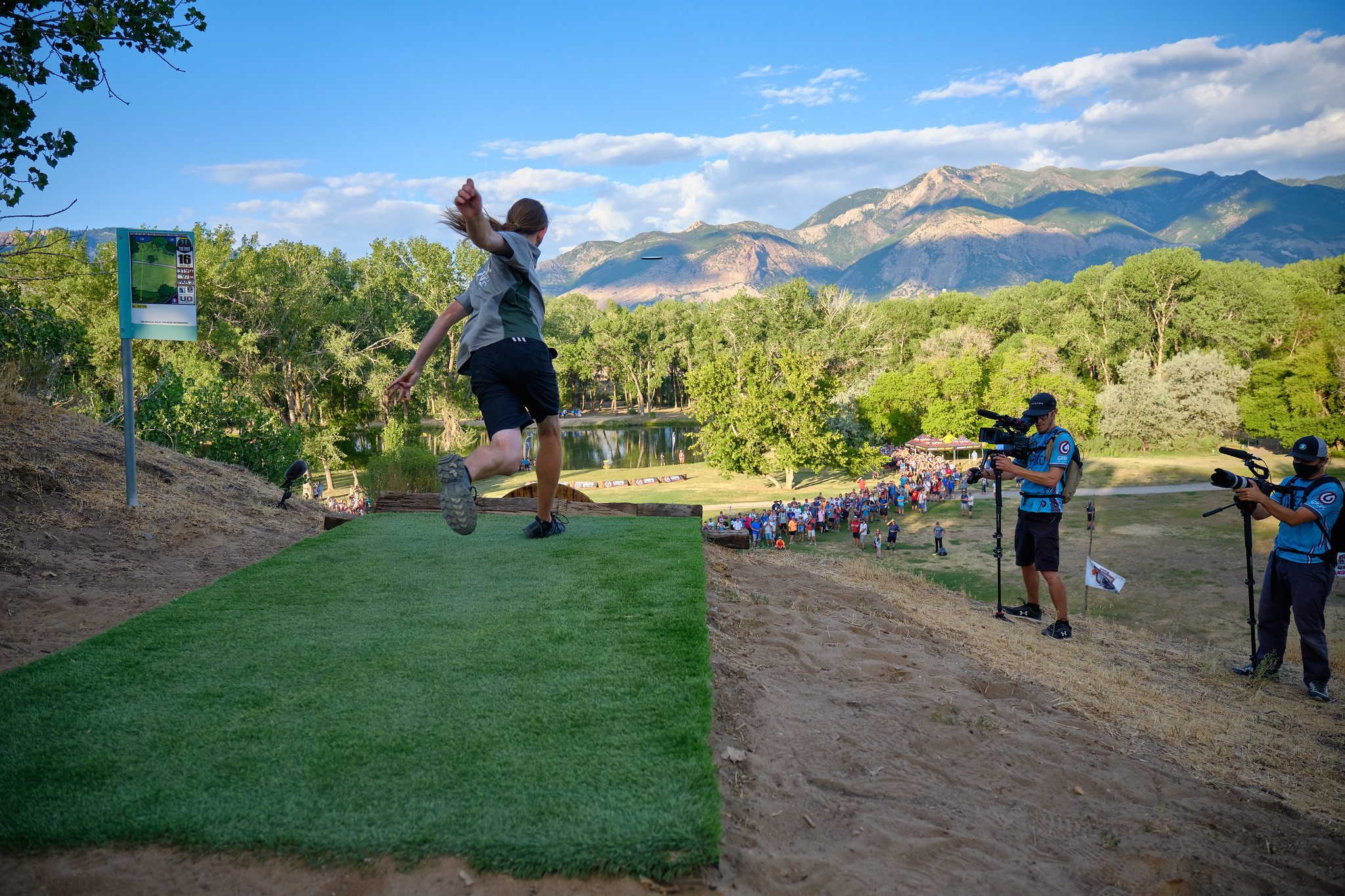
James Conrad dominated hole 16 at The Fort and won his PDGA World title on the first playoff hole. Photo: Kevin Huver / PDGA
How do you keep your head in a good space during those high-pressure moments?
I wouldn’t say there’s a specific thing I do to try to maintain that focus level, but it’s a lot bigger than ok, at this moment I need to focus. It’s kind of a week-long thing for a tournament that big. We were in Utah for close to three weeks so I was preparing and kind of resting a good amount of time, trying to push anything off the disc golf course to the back, or out of my mind entirely, especially during the tournament rounds. I had done a good job of that throughout the week. It takes a ton of focus and work just to be in the finals, in the lead card round. To stay mentally tough for four or five days, to even be in that position, you’re pretty locked in on the focus at that point. If you’ve been doing it all week and even for a couple of weeks preparing, to just kind of continue. It’s not like ‘now is the time to focus’ it’s kind of like a continual process the whole week.
That entire final round at Worlds, the race was pretty close. What helped you keep pushing?
It’s hard to say, I think some of my past experiences definitely helped. Like the 2018 and 2019 Worlds I was in a similar position, making the final round lead card. I’d say the pressure got to me pretty bad my first time in 2018, being in that spot. And then 2019 I feel like I played well. I didn’t keep up with Paul or Ricky but I ended tied for third. So having that experience in the previous world championships helped me believe I belonged there and that it wasn’t a fluke that I was in the position that I was in. It felt like I was supposed to be there and that I had as good of a chance as anyone. Just believing in yourself like that and staying in the present moment, not getting too worried about what the round means or anything like that, just trying to focus everything you have on each shot is, I think, kind of my mindset for it.
How did you celebrate the victory?
I was at the course for a good while after the round ended. I was doing some disc signing and then the award ceremony and then there was a PDGA photo shoot. After all that wound down, we had a good group of our friends – my girlfriend and some of the people on tour. There werent a lot of food options open, but we found a bar that had their kitchen open, so we had about 12 people that all went to this bar and just got some bar food and had a few drinks and just kind of enjoyed the moment and each other’s company. Everyone was super stoked. It was a lot of fun.
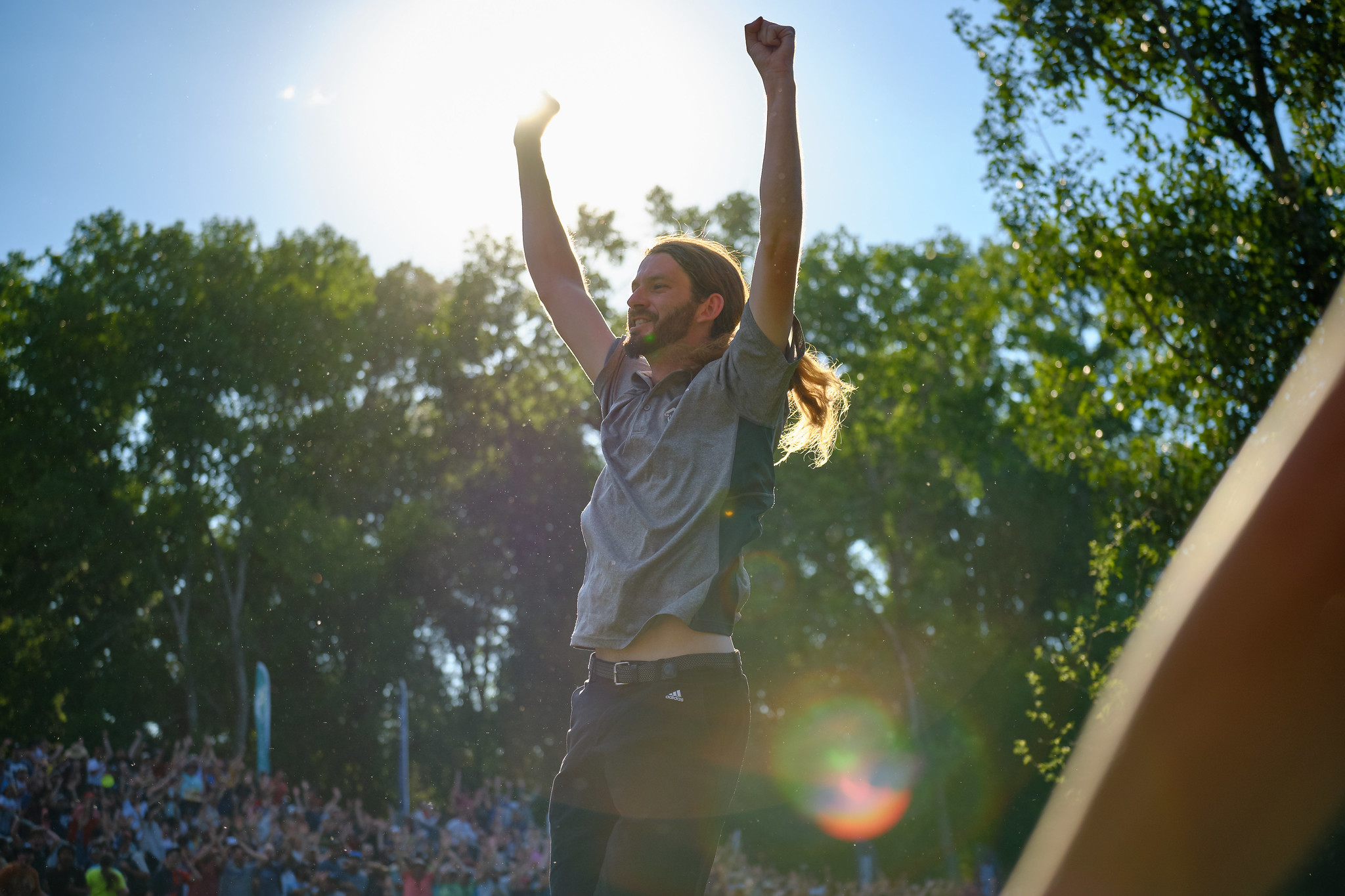
James Conrad celebrates after tying things in style at the 2021 PDGA Pro World Championship. Photo: Kevin Huver / PDGA
Do you think capturing the world title, especially in the way you did it, has changed anything for you moving forward?
I think it will definitely boost my career, like my potential earnings and those kind of things, but at the same time, I don’t think it changed too much about me personally or in terms of the path I’m on, anything like that. I think I want to continue competing at disc golf, continue trying to have fun on and off the course, trying to be the same me. It’ll be nice in the long run, just a better resume. Down the road, if I don’t want to be competing, having that world title under my name is something that will, I think, make any other doors that I want to go through a little wider open or a little easier to pursue. Or other jobs within disc golf, whether it’s course design or anything like that. Just having that under my name is a huge accomplishment and something that will continue paying off throughout my life.
Any luck on that Pantene shampoo sponsorship yet?
No, not yet, I haven’t really tried too hard to secure any additional endorsement deals but yeah, a hair care one would be funny.
You did say in a recent interview that your look could break down stereotypes of what an athlete could look like. Disc golf is a sport that almost anyone can do. How do you feel we can continue to improve that accessibility?
I think it’s very accessible as it is. Just getting it more into the mainstream and getting more people to realize how much fun it is and how accessible it already is will continue to improve that. I think there’s a ton of people out there, doing tons of work, pushing disc golf to younger crowds. Uplay Disc Golf is out there introducing it to schools all over, and Edge Disc Golf is doing the same. Just the amount of courses going in, I feel like it won’t be long before there’s hardly a neighborhood that’s not within a short drive of a disc golf course and that makes it just as accessible as possible, I think.
Do you think addressing some of the criticism players presented at Worlds is part of how we grow the sport? Did you feel the concerns were legitimate?
I feel like it’s important for us as players to address when we have concerns and the more polished that a tournament is and the more polished that it appears, is pretty big. If we’re looking to be on national television and there’s stuff that just doesn’t look very professional, if the course is changing mid-tournament and things like that, I feel like it’s not the best look. The more real that we look, the more real that people that are not into the sport will see us as.
But I also feel like it’s never going to be perfect. I feel like there’s times, if there are legitimate concerns, that it’s worthwhile to voice them. But I feel like sometimes people are a little overboard with it. Maybe just looking for things to complain about and looking for reasons outside of themselves that they might not have done well. I’m sure there’s a line somewhere in between there where if there’s legitimate concerns and good ways to improve the tournaments or the conditions that we play on, I think those are definitely worth voicing but sometimes being a little bit too nitpicky might be detrimental.
It’s safe to say your first year on Team MVP is going pretty well. What sold you on MVP, why did you decide they were right for you?
I’d say I was kind of ready for a change. I was with Innova for quite a long time and definitely enjoyed the product. I never felt slighted by them but I felt somewhat like I was stuck in the same routine. I wasn’t really shaking anything up and wasn’t really putting myself out there on the social media platforms. It was comfortable to stay with them and I felt like it would have been very easy going about things the same way. So I felt like a change could be good. MVP had approached me quite a while before I signed, expressing interest, so I think they were kind of in the back of my mind from that. Everything that I had heard about them was that it was good people running them and that they just really loved the discs and they were just trying their hardest to make the best discs they could and focus more on that than on trying to buy high-name pros. When they approached me and they felt like they were at that point where they were ready to up their sponsorship game, it just felt like a really easy fit and made sense.
It seemed like in the beginning of the year you maybe struggled with the new plastic as you got used to it. What did you do to help adjust to the changes?
I think early in the year I had some good moments and there was definitely times where a lack of familiarity might have cost me some strokes. I wasn’t disappointed with how I started my season at all. I’ve found in the past that usually the first month or two of the season hasn’t treated me super well. My game kind of relies on getting into a rhythm and getting used to that competition mindset and finding that focus level. As the season progressed, I found it easier and easier to find that focus level required and spend more of my time in the rounds in that mindset. I definitely think I’ve done more field work and more just general disc practice since I’ve switched, just trying to get used to the discs. But there’s no comparison to tournament experience, you know throwing a disc in a high-pressure situation and seeing it perform well. It just took some time and some repetitions to get that comfortable with my discs and to really trust them. Definitely was able to find that focus pretty quick. Second place at OTB felt pretty big and pretty much since May or June, maybe even a little earlier, I felt very comfortable with them and it was just a matter of putting all the pieces together at the right time.
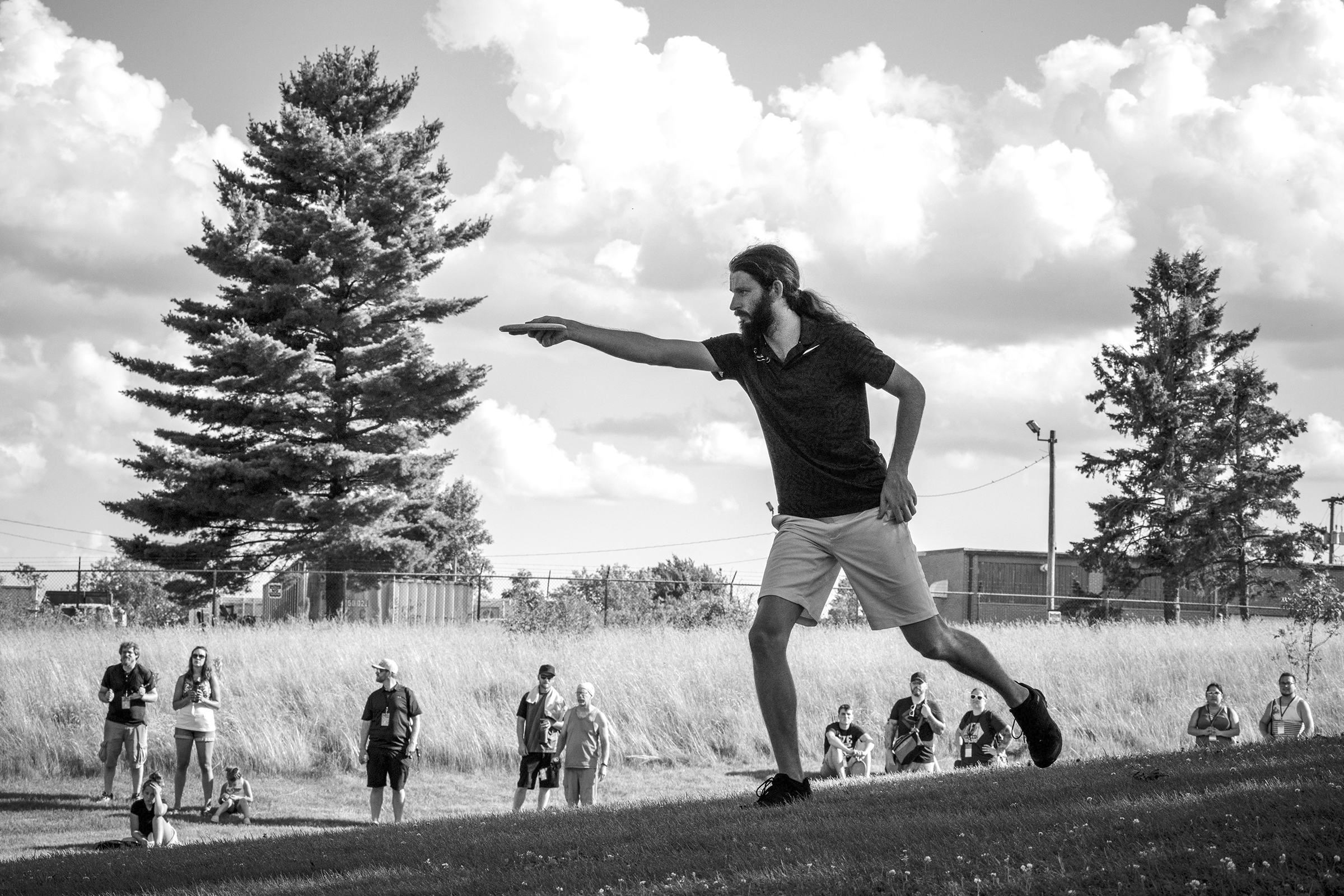
James Conrad worked with MVP to design his putter, the Nomad. Photo: Lauren Lakeberg
You helped design your putter, the Nomad. What was that process like?
It was a cool process. I was pretty involved right away, it was actually very early this year when we started working on it. It takes quite an amount of time to get a new mold from start to finish. I sat down with Chad who is the engineer at MVP and we looked at a ton of different putters and at my grip. He had some putters cut in half to really highlight some of the minute differences. It’s not like a huge difference between pretty much any two putters, but just the small differences in angle coming around the outer edge, the thickness of the rim, the thickness of the flight plate, all these little details are what subtly influence the feel and the flight of the disc. Getting to just kind of take a deep dive into all of that and what I want a putter to feel like in my hands and how I want it to fly. Once we kind of worked through all that info, he pretty much just ran with it. And the Nomad he came up with has been great, I’ve been loving it.
Is there a story behind the name?
Yes and no. We wanted something that didn’t necessarily fit in with the existing MVP naming scheme but something that wasn’t necessarily too far away from it either. Definitely wanted it to feel personalized towards me. Pretty much any full-time touring disc golfer lives a pretty nomadic lifestyle. Some of us might have homes somewhere but most of us spend at least nine months out of the year on the road traveling around. I feel like that’s one of my favorite parts of the lifestyle, the ability to always be on the road but never really be away from home.
Disc golf has been part of your life since your dad discovered it in 1996. Have you always loved playing? Was there a moment you realized it’s what you wanted to do for the rest of your life?
I’ve definitely always loved it. I’d say the whole time growing up, I never really expected to pursue disc golf as a career. I wouldn’t say I expected to quit disc golf at any time or anything like that, I figured I’d always like it and always be playing. But back in the early 2000s it was just so much smaller, there was pretty much only a handful of people that toured and I didn’t really know any of them. I didn’t follow the pro scene much when I was kid and didn’t even realize it was in the realm of possibilities. I’d say once that changed, it was probably about 2015 - 2016 when it was starting to get a little more prominent on YouTube and there was starting to be more and more coverage of it. And then they announced the Disc Golf Pro Tour with the goal of making a more sustainable tour and making room for more players to tour. That definitely caught my interest and made me decide that it was worth at least trying out. Once I did a three-month tour in 2016, I pretty much never looked back.
Your parents now have a disc golf course on their property. What role does your dad still play in your disc golf life?
I don’t get to see my parents too often, that’s definitely one of the drawbacks of the tour lifestyle, that you’re not in one place for long and not back too often. But my dad and my mom are definitely two of my biggest supporters in the world. They’re super proud of me and even from the first time I was like “Hey guys, I’m going to hit the road for a few months” they were like “That’s awesome!” They might have been worried at times but they never tried to talk me away from it or anything like that. I’m very grateful to have their support and their love. It’s cool, my dad still plays all the time on his home course. Pretty much everyone that comes out to play, he almost always plays a round with them. He plays a round most days, sometimes even two. It’s definitely fun to get a chance to play with him when I’m back home.
Did you have anyone that you looked after growing up, or modeled your form after?
I obviously learned a ton from my dad. He was the main one I played with growing up. We moved around quite a bit, so I’m sure I picked up things here and there from some of the different local pros we played with. I wouldn’t say, besides my dad, that there’s one disc golf role model I had. But I had a chance to play with a ton of different people around the country even as a kid. Even if it was never a lesson, like “Here James, here’s how you should do that,” just seeing how each player just kind of does it in their own way, how there’s similarities but differences. Picking up on all of those things and just throwing a lot.
What’s your advice for someone looking to pursue their own disc golf dreams?
I think the best advice I could give was to just try to stay open and to believe in yourself. To realize there’s a lot of different ways to get it done so find something that works for you and a way of traveling that suits you well. I feel like a big step to having any success on tour is to enjoy the tour lifestyle, if you’re like “Oh I hate it, I’m driving everywhere, I’m staying in hotels, this is not fun,” that’s going to definitely reflect on your disc golf performance at the tournaments you’re traveling to. You have to kind of embrace the lifestyle and then, if you’re enjoying yourself and enjoying your time and enjoying competing in disc golf, then the ceiling is very high. You have a ton of opportunities to learn and for your game to improve. When pretty much the main focus you have is disc golf, that’s when you can really start to get good.
What’s your favorite Virginia course?
I think my favorite course in Virginia is the Darkside at the Blockhouse Disc Golf and Country Club. I haven’t been there in a while, but for quite a few years that was one of the things I looked forward to most in the year, was the chance to go spend a week up at the Blockhouse and play the Sunnyside, the Darkside, and the Tiki course. Definitely hope to make it back there sometime soon.
Have you played Lake Marshall yet?
I have, yeah. Lake Marshall is awesome too. I was able to play the VTI [Virginia Team Invitational] there this spring. It’s just an epic venue and some top-notch courses. I hope it can make its way onto the tour sometime in the next couple of years. That would be really cool to have a big tour event in Virginia.
Check out the Fall 2021 issue of DiscGolfer Magazine»
I read in your girlfriend Jordan’s blog that in 2020 you both spent 294 nights in your van. Do either of you ever get sick of van life?
I don’t think either of us have gotten sick of van life. There are definitely moments where it’s difficult. This time of the year in the Midwest, it’s sometimes borderline miserable if it’s super humid and hot all day and not even cooling off much at night. We’re not really in a position where we have to spend all of our time in the van. If we’re somewhere and the weather doesn’t look nice for the whole week, a lot of time we’ll split an Airbnb with some friends. Even if we split an Airbnb but sleep in the van, just having that room to spread out a little and have some air conditioning in the heat of the day, really makes a world of difference.
What is the most challenging part of being on the road all of the time?
Probably the most challenging part is just the difficulty of not having that much time to spend with family members or friends from back home, that kind of thing. But we have such a nice community of disc golfers that definitely offsets it. We have our tour family and all of our friends that we’re seeing day in and day out, that definitely limits the loneliness or the difficulty of not being able to see your blood family all that often.
It seems like the people are part of what makes being on the road so much fun. The friendships you’ve cultivated, Catan game nights and things like that.
Yeah, definitely. We’re all kind of like-minded people to want to pursue this with our lives and then the opportunity to live such a free kind of lifestyle around people that we really care about and enjoy spending time with is really special.
Do you have a favorite moment from being on the road?
That’s a tough one. There’s a lot. I’d say, one of my favorite moments was last summer at the Preserve. The tournament ended on Sunday, July 5. It’s actually my girlfriend Jordan’s birthday, so after the tournament ended we had a big group of friends that all floated the river. It was a full moon that night as well, so we were all camped out at the Preserve and had kind of a full moon party right after the tournament ended. It was pretty amazing.
Craziest or weirdest thing that’s ever happened while on tour?
The celebrity Pro-Am event, that was maybe not crazy but a unique experience to just be around a bunch of celebrities and people that are way more famous than disc golfers in a lot of senses, but to have them kind of have that like ‘Oh my gosh, it’s James Conrad, it’s Paul McBeth’ moment was pretty wild. We were in Ben Askrin’s house and they opened this little trap door and Paige Pierce shot down a slide into the basement and we all kind of followed her down the slide into a sweet basement. That was a good one.
What’s one thing that can make your day better no matter what?
A good cup of coffee or a really good disc golf shot. Either of those can just instantly make me feel a lot better.
How would you spend an ideal day off, away from disc golf?
A few of my favorite ways to spend a day off from disc golf would be like a river trip, like floating on a river, a nice hike up in the mountains or a good concert or music festival. Those would probably be my top three.
Is there anything else, aside from Juggling, that you spend your off time doing?
I feel like I kind of go through cycles. I’m a pretty big fan of pretty much any kind of games, whether board games or sometimes video games. I’ve been reading a lot this year, even if it’s just 30 minutes before bed or something. I’ve been on a cheesy, sci-fi fantasy series called the Dresden Files. It’s nothing spectacular but just kind of fun to read.
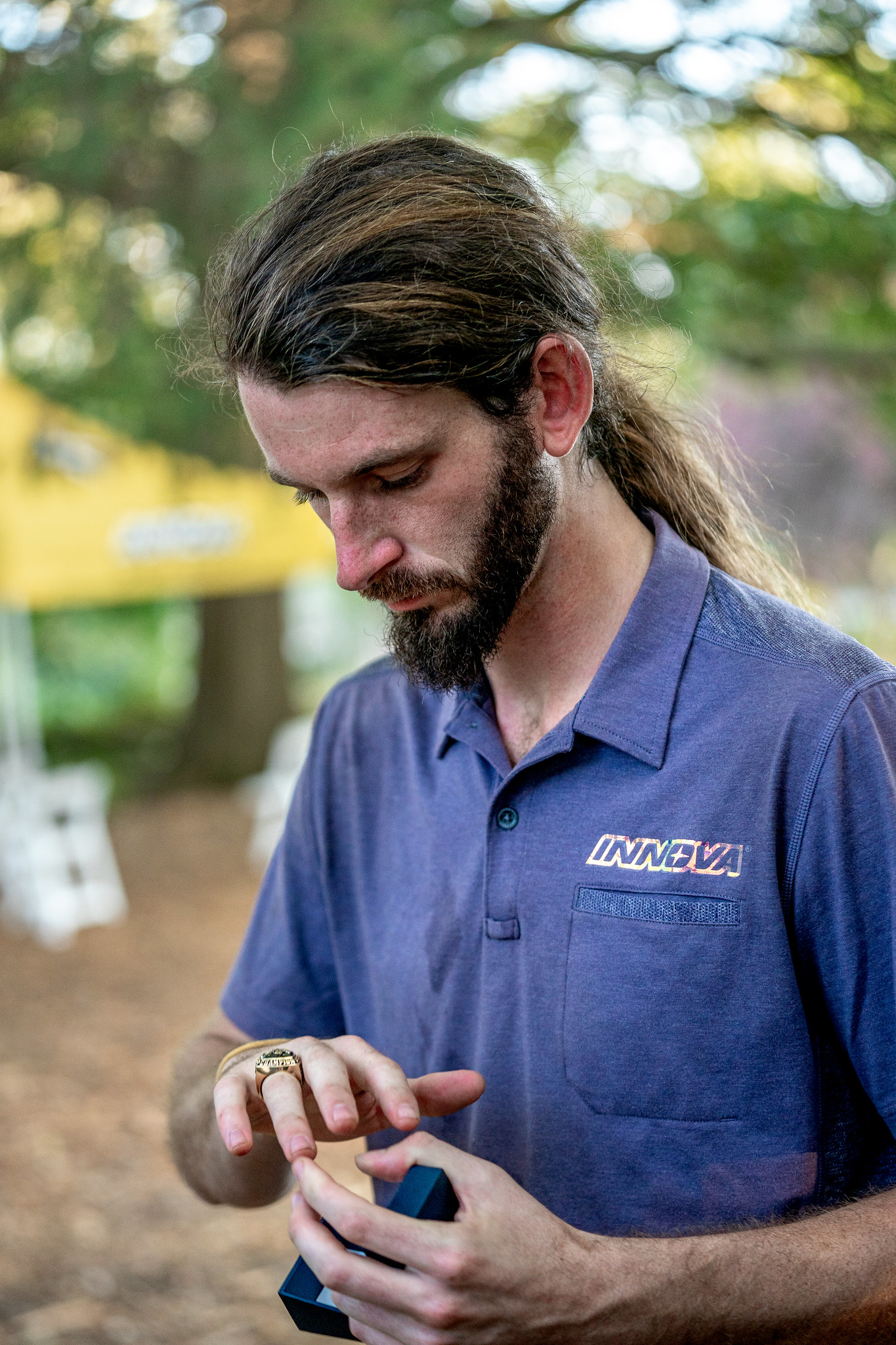
James Conrad receives his ring after winning the 2019 USDGC. Photo: Alyssa Van Lanen / PDGA
So, with a resume that includes 2018 Maple Hill, 2019 USDGC, 2021 PDGA Worlds, where do you go from here? What goals do you chase next?
I’d say, I think it would be really special to win a big European event like the European Open. I think that would be an awesome addition to that list of accomplishments. Outside of that, mostly I just want to keep enjoying the game and keep being out there competing and hopefully get some more good wins.
And do you have any non-disc golf related goals?
I definitely do, I’ve been kind of trying to figure out exactly what those look like. One that’s just kind of for fun is that I’d like to, by the time I’m 40, I’m 31 now, I’d like to be at least decent at a seven-ball juggle. I’ve gotten up to five to where that’s pretty smooth and I can keep it rolling pretty well. I think doing a seven-ball juggle would be pretty awesome.
- posted 2 weeks ago
- posted 2 weeks ago
- posted 3 weeks ago
- posted 3 weeks ago
- posted 3 weeks ago
- ‹ previous
- 3 of 699
- next ›
- posted 6 months ago
- posted 9 months ago
- posted 10 months ago
- posted 1 year ago
- posted 1 year ago
- ‹ previous
- 3 of 27
- next ›
